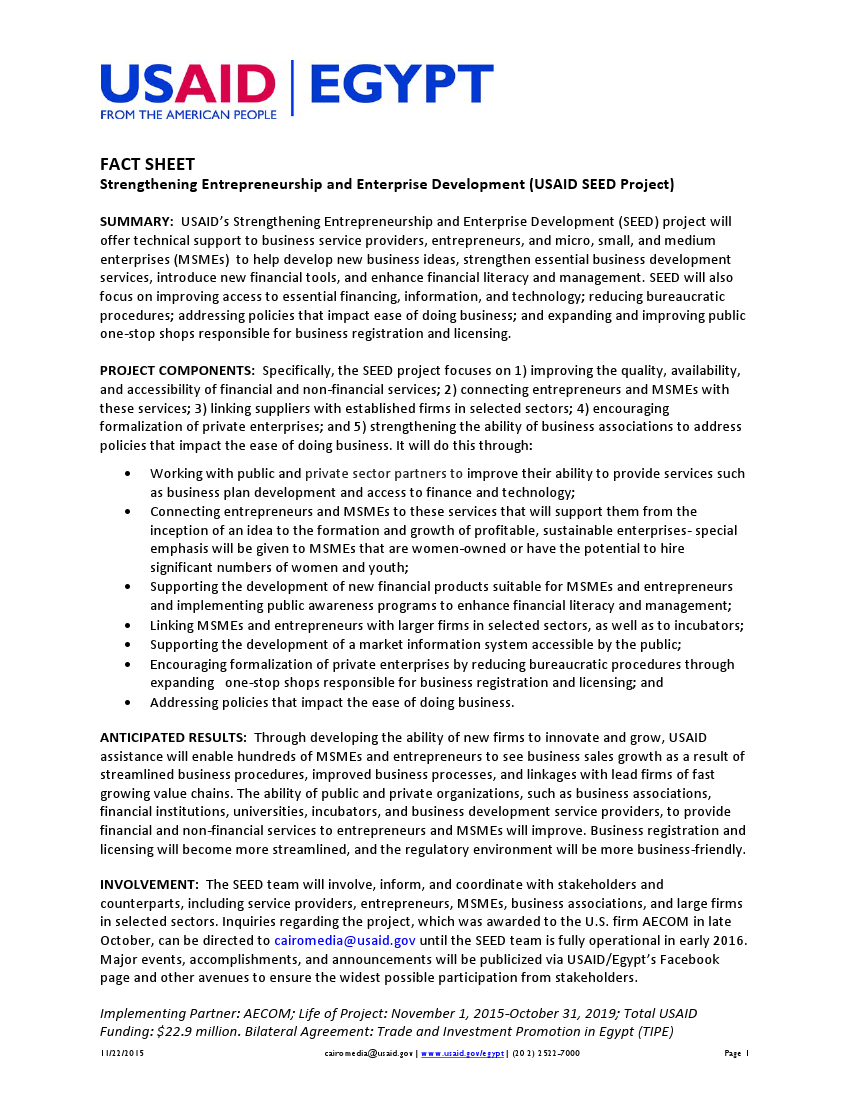SUMMARY: USAID’s Strengthening Entrepreneurship and Enterprise Development (SEED) project will offer technical support to business service providers, entrepreneurs, and micro, small, and medium enterprises (MSMEs) to help develop new business ideas, strengthen essential business development services, introduce new financial tools, and enhance financial literacy and management. SEED will also focus on improving access to essential financing, information, and technology; reducing bureaucratic procedures; addressing policies that impact ease of doing business; and expanding and improving public one-stop shops responsible for business registration and licensing.
PROJECT COMPONENTS: Specifically, the SEED project focuses on 1) improving the quality, availability, and accessibility of financial and non-financial services; 2) connecting entrepreneurs and MSMEs with these services; 3) linking suppliers with established firms in selected sectors; 4) encouraging formalization of private enterprises; and 5) strengthening the ability of business associations to address policies that impact the ease of doing business. It will do this through:
ANTICIPATED RESULTS: Through developing the ability of new firms to innovate and grow, USAID assistance will enable hundreds of MSMEs and entrepreneurs to see business sales growth as a result of streamlined business procedures, improved business processes, and linkages with lead firms of fast growing value chains. The ability of public and private organizations, such as business associations, financial institutions, universities, incubators, and business development service providers, to provide financial and non-financial services to entrepreneurs and MSMEs will improve. Business registration and licensing will become more streamlined, and the regulatory environment will be more business-friendly.
INVOLVEMENT: The SEED team will involve, inform, and coordinate with stakeholders and counterparts, including service providers, entrepreneurs, MSMEs, business associations, and large firms in selected sectors. Inquiries regarding the project, which was awarded to the U.S. firm AECOM in late October, can be directed to cairomedia@usaid.gov until the SEED team is fully operational in early 2016. Major events, accomplishments, and announcements will be publicized via USAID/Egypt’s Facebook page and other avenues to ensure the widest possible participation from stakeholders.
Implementing Partner: AECOM; Life of Project: November 1, 2015-October 31, 2019; Total USAID Funding: $22.9 million. Bilateral Agreement: Trade and Investment Promotion in Egypt (TIPE)
FREQUENTLY ASKED QUESTIONS
How can I get involved?
The SEED team will involve, inform, and coordinate with stakeholders and counterparts, including service providers, entrepreneurs, MSMEs, business associations, angel investors, financial institutions, NGOs, universities, accelerators and incubators, and large firms in selected sectors. If you wish to participate in initial consultations, please contact cairomedia@usaid.gov.
How can I learn more? Who can I contact?
Inquiries regarding the project can be directed to cairomedia@usaid.gov until the SEED team is fully operational in early 2016. Information will be publicized via USAID/Egypt’s Facebook page (www.facebook.com/usaidegypt) and other avenues to ensure the widest possible participation.
When will USAID’s SEED project get started?
The SEED contract was awarded in October 2015 and the team expects to be operational in Cairo in early 2016. Information will be posted on USAID/Egypt’s Facebook page.
How can my small firm access business development services through SEED?
Connections with small firms will be made via a number of avenues, including the newspaper, social media, and the internet. Once the project is operational in early January, we will begin providing technical assistance and capacity building to business service providers to be more efficient in providing business development services to entrepreneurs and MSMEs. We will also connect entrepreneurs and MSMEs to those service providers who will determine how to best help build your business.
I am a business development service provider. How can I partner with USAID on this project?
Please contact cairomedia@usaid.gov if you are:
- Interested in strengthening the business services you provide to small firms;
- Interested in helping your clients connect with business incubators and accelerators ; or
- Interested in addressing policies and services that impact the ease of doing business.
Can any MSME anywhere in Egypt participate?
The project will try to involve the largest possible number of MSMEs throughout Egypt, but special emphasis will be given to small firms that are women-owned or have the potential to hire significant numbers of women and youth. The project will potentially work nationwide but will have most of its activities in areas where there are more businesses and entrepreneurs. Special attention will be given to disadvantaged communities.
Are you giving startup funding to entrepreneurs?
No. This project focuses on improving the ability of service providers to help small firms access business development services and in turn, will connect small firms to these services, including organizations that may have funding for entrepreneurs.
Who is the implementing partner?
The implementing partner for this contract is U.S. firm AECOM.
What happened to the “old” entrepreneurship project?
All agreements have an end date, and the Egypt Competitiveness Project ended as planned. Through the new SEED project, USAID continues to be committed to working with Egyptian partners to implement a wide range of activities to support entrepreneurship and micro, small, and medium enterprise development in Egypt.
- Working with public and private sector partners to improve their ability to provide services such as business plan development and access to finance and technology;
- Connecting entrepreneurs and MSMEs to these services that will support them from the inception of an idea to the formation and growth of profitable, sustainable enterprises- special emphasis will be given to MSMEs that are women-owned or have the potential to hire significant numbers of women and youth;
- Supporting the development of new financial products suitable for MSMEs and entrepreneurs and implementing public awareness programs to enhance financial literacy and management;
- Linking MSMEs and entrepreneurs with larger firms in selected sectors, as well as to incubators;
- Supporting the development of a market information system accessible by the public;
- Encouraging formalization of private enterprises by reducing bureaucratic procedures through expanding one-stop shops responsible for business registration and licensing; and
- Addressing policies that impact the ease of doing business.








Comment
Make a general inquiry or suggest an improvement.